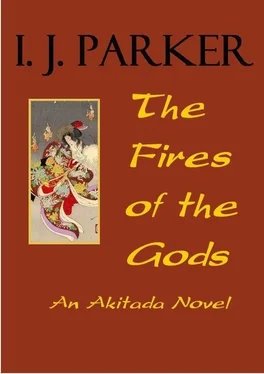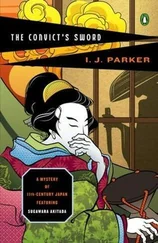I Parker - The Masuda Affair
Здесь есть возможность читать онлайн «I Parker - The Masuda Affair» весь текст электронной книги совершенно бесплатно (целиком полную версию без сокращений). В некоторых случаях можно слушать аудио, скачать через торрент в формате fb2 и присутствует краткое содержание. Жанр: Исторический детектив, на английском языке. Описание произведения, (предисловие) а так же отзывы посетителей доступны на портале библиотеки ЛибКат.
- Название:The Masuda Affair
- Автор:
- Жанр:
- Год:неизвестен
- ISBN:нет данных
- Рейтинг книги:3 / 5. Голосов: 1
-
Избранное:Добавить в избранное
- Отзывы:
-
Ваша оценка:
- 60
- 1
- 2
- 3
- 4
- 5
The Masuda Affair: краткое содержание, описание и аннотация
Предлагаем к чтению аннотацию, описание, краткое содержание или предисловие (зависит от того, что написал сам автор книги «The Masuda Affair»). Если вы не нашли необходимую информацию о книге — напишите в комментариях, мы постараемся отыскать её.
The Masuda Affair — читать онлайн бесплатно полную книгу (весь текст) целиком
Ниже представлен текст книги, разбитый по страницам. Система сохранения места последней прочитанной страницы, позволяет с удобством читать онлайн бесплатно книгу «The Masuda Affair», без необходимости каждый раз заново искать на чём Вы остановились. Поставьте закладку, и сможете в любой момент перейти на страницу, на которой закончили чтение.
Интервал:
Закладка:
They bowed and murmured their assent. Lady Masuda put her arm around the sobbing Kohime to support her on their way out of the room.
The old lord waited until the door had closed after them before his face cleared. ‘I have a grandson. You have made an old man cling to life again,’ he said to Akitada.
‘There is one request, sir.’
‘I am grateful. Only ask, and it shall be so.’
‘The boy has an uncle. His mother’s brother is a monk. He has only now found out the fate of his sister and her child and hopes to stay in touch. I think you will find him a pleasant and well-educated young man.’
‘He shall be welcome.’ The old lord clapped his hands. ‘Bring my grandson to me,’ he cried.
The boy returned and sat down beside his grandfather.
‘Well, Yori,’ the old man asked, ‘how do you like it here‘I Will you come to live with your old grandfather?’
‘Yes. Thank you, Grandfather. But I would like Patch to live here, too.’
The old lord stroked his hair. ‘Who is Patch?’
‘He’s my cat.’
Lord Masuda looked at Akitada, who said with a smile, ‘Patch still lives in the lake villa. He has been helpful in bringing you and your grandson together.’
‘Then we shall bring him here,’ said the old man and hugged the boy.
As they left the mansion, Akitada said to his wife, ‘I’m sorry we couldn’t keep him, my dear.’
She gave him a watery smile and touched his hand for a moment.
They told Tora what had happened on the homeward journey. He received the news with great satisfaction, ‘What a pair of vicious females! I bet poor Peony thought all was forgiven and that the money was to take care of them. That’s what made her send for Little Abbess. It took a clever mind and a lot of legwork to figure out a nasty tangle like that Masuda affair. We did a fine job, sir, if I do say so myself.’
Akitada smiled. ‘If I recall correctly, you were mostly working on the Fujiwara affair.’
‘The Fuji-? Oh, you mean Sadanori?’
‘Yes. Sadanori had nothing to do with the fate of the child, and he did not kill Peony. He was responsible for only one murder, young Masuda’s, and even that might not have happened if Ishikawa hadn’t urged Sadanori on.’ He shook his head. ‘It amazes me what lengths men will go to for love.’ When nobody spoke, he looked up. ‘Don’t you agree?’ he asked.
Tamako lowered her eyes and murmured, ‘Yes.’
Tora grinned. ‘I’m very glad you got over it, sir. Lately, there’s been no telling what you might do next.’
Akitada looked at his wife, who blushed and said nothing. ‘Oh,’ he said, ‘I must have behaved very badly.’
Tamako said, ‘Not at all.’
Tora muttered, ‘Forget what I said, sir. I didn’t mean it.’
‘No, you were right. I wanted that child’s affection so badly because I miss Yori. Perhaps that’s why I make excuses for Sadanori. And for Ishikawa’s mother and those Masuda women.’
Tamako reached out to squeeze his hand. ‘How they must have suffered! Poor Peony and poor child! And those two women, rejected by their husband and worried about their future. They only tried to buy the boy to give the old lord an heir, and then this terrible thing happened.’
‘Some people are born with bad karma,’ Tora pointed out.
Tamako frowned at him. ‘Not in this case. Women like Peony have to sell their bodies and souls to men.’
Akitada thought guiltily of Little Wave in her pink-silk gown. He looked at his wife.
Tamako looked back and smiled, and suddenly, the sun was bright, the trees green, the colors of his wife’s robe beautiful, and the air was filled with birdsong and the scent of flowers.
Their return journey was like a homecoming after a long absence. Some day they would return to Otsu to visit the child who had come into Akitada’s grief so briefly.
Life places obligations on a man, and he had neglected his for too long.
HISTORICAL NOTE
Kyoto was founded in 794 A.D. as Heian-Kyo (Capital of Peace and Tranquility) and laid out on the pattern of the Chinese city of Ch’ang-An. Thus, its major and minor streets formed a grid-pattern along a north-south axis, with the walled Greater Imperial Palace (Daidairi) occupying the northern center. The Greater Imperial Palace encompassed the emperor’s and crown prince’s palaces, as well as the government buildings, imperial treasury, and guards’ headquarters. The villas and mansions of the nobles and of members of the imperial family clustered around, while the rest of the population of about 200,000 – government officials, civil servants, craftsmen, merchants, laborers and entertainers – occupied the remaining two-thirds of the city. The city was divided into a right and left administration. Such divisions into right and left were common in the government structure and extended even to games and contests. Suzaku Avenue, a broad, willow-lined thoroughfare, formed the dividing line and led straight from the southernmost city gate (Rashomon) to the main gate of the Greater Imperial Palace (Suzakumon). The city is said to have been beautiful, with its broad avenues, its rivers and canals, its palaces and parks; and originally it probably contained some 80,000 dwellings, but by the eleventh century parts of it, notably the western and southern quarters, had begun to deteriorate and the population had shrunk. Among the disasters that preyed on the city and caused its decline were frequent earthquakes, fires, storms, and epidemics (from 806-1073 A.D. there were 653 earthquakes, 134 great fires, and 91 epidemics recorded.) A certain amount of lawlessness accompanied disasters and further drove people to resettle elsewhere.
Heian-Kyo was carefully located to be protected from evil influences – in the north by mountains, in the east and west by the Kamo and Oi Rivers, and in the south by the confluence of these rivers and other rivers in the Ogura swamp. Major highways led south and west to the old capital of Nara and to the Inland Sea and the western provinces, and east to Lake Biwa, and from there to the Northern and Eastern provinces. In addition, there was much travel by water on the major rivers and on Lake Biwa. The foothills around the capital, the shores of Lake Biwa, and Uji (a picturesque setting on the Uji River southeast of the capital) were favored by the nobles for their country retreats or retirement temples. Uji is the famous setting in the final chapters of the eleventh-century novel Genji by Lady Murasaki.
Two state religions, Shinto (a native faith that venerates deities of agriculture) and Buddhism (imported from China via Korea and embraced by the court) coexisted peaceably. The fox shrine mentioned in this novel is a Shinto shrine, while the mysterious monk is a practicing Buddhist priest. The emperor, as a descendant of the native gods, celebrated Shinto rites during his tenure, but often took the tonsure as a Buddhist priest upon retirement or serious illness. A number of annual festivals have quasi-religious significance, among them the three day O-bon (or urabon) celebration, honoring the dead, who are thought to return briefly for a visit to their homes. This celebration has its origin in Chinese ancestral worship and Buddhism.
The government in eleventh-century Japan was also derived from the Chinese model, which was based on education and excellence, but by the eleventh century it had deteriorated into rule by the sons of a few noble families, primarily the large Fujiwara clan. Centrally located in Heian-Kyo, the government controlled, at least nominally, the rest of the country by imperially appointed governors. Akitada, who is essentially a civil servant, currently serves as senior secretary in the Ministry of Justice headed by a Fujiwara minister. Civil servants drew salaries commensurate with their rank and office. Law enforcement was in the hands of a police force and of local wardens, who were responsible for their district and reported serious crimes to the police. Judges worked as adjuncts to the police departments. Because of the Buddhist injunction against taking life, there were few executions. Prison terms were common, though often cut short by frequent imperial pardons, and exile was the preferred punishment for serious crimes.
Читать дальшеИнтервал:
Закладка:
Похожие книги на «The Masuda Affair»
Представляем Вашему вниманию похожие книги на «The Masuda Affair» списком для выбора. Мы отобрали схожую по названию и смыслу литературу в надежде предоставить читателям больше вариантов отыскать новые, интересные, ещё непрочитанные произведения.
Обсуждение, отзывы о книге «The Masuda Affair» и просто собственные мнения читателей. Оставьте ваши комментарии, напишите, что Вы думаете о произведении, его смысле или главных героях. Укажите что конкретно понравилось, а что нет, и почему Вы так считаете.












